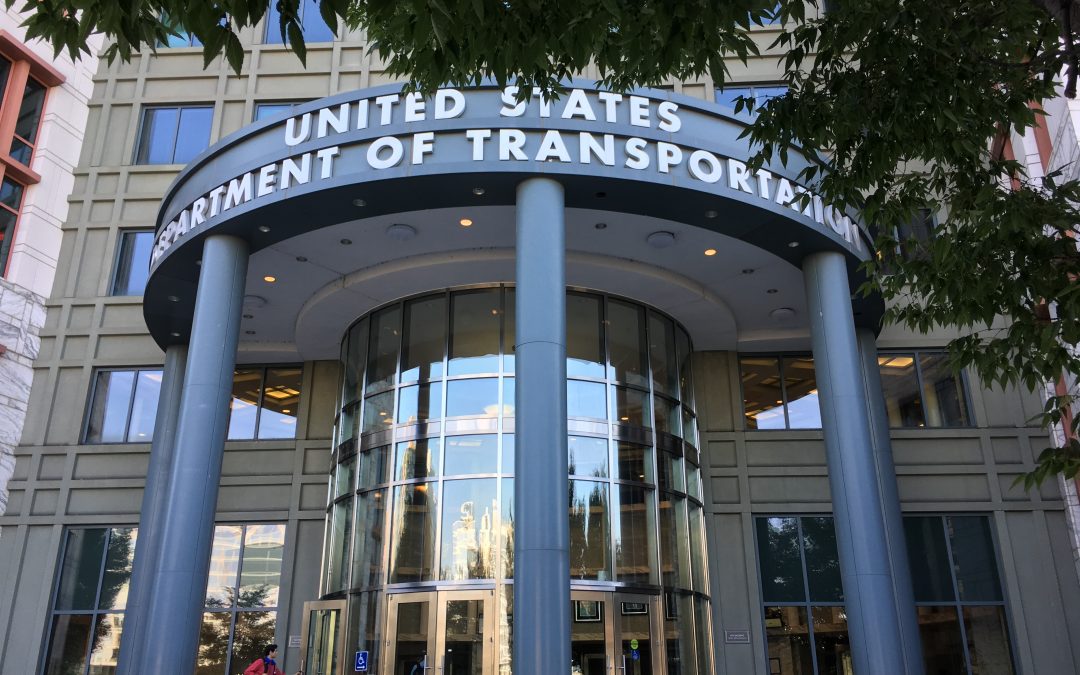Image: RNT Foundation
Blog Editor’s Note: Last Thursday, the 4th of August, the Department of Transportation held a round table to discuss various issues related to complementary PNT.
RNT Foundation was represented by our board member the Hon. Greg Winfree, Director of the Texas Transportation Institute at Texas A&M University. He also served as the Assistant Secretary responsible for PNT issues at the Department of Transportation during the Obama administration. In addition to Greg, 15 other RNTF members participated in the event.
The over 100 attendees included representatives from companies that provide PNT services, companies in telecom, network, and other areas that depend heavily on PNT, and employees or reps from a wide variety of government agencies and portfolios (including health care – not one we think of everyday).
The week before the event RNT Foundation sent a letter to the host, Dr. Robert Hampshire, Deputy Assistant Secretary for Research and Technology, outlining some of the issues we thought most important. We were glad to hear there seemed to be general agreement among the PNT users and providers at the event with our positions. Here is the text of our letter:
31 July 2022
Dear Dr. Hampshire;
Thank you for the opportunity to participate in the August 4th industry roundtable on GPS backup and complementary technologies.
We are confident that the department and other attendees already agree threats to GPS and America are real, serious, and highly varied. That America’s dangerous over-dependence on GPS must be mitigated. And that widely adopted PNT alternatives will help “get the bullseye off GPS” making both GPS and America safer, and the nation more economically secure. We propose baseline agreement on these items up front to ensure a more productive roundtable.
We believe a majority of industry members agree with the following and offer them for your consideration as discussion topics:
- The government has done enough studies of PNT technologies
- DOT’s Jan 2021 GPS Backup Tech Demo Report results are consistent with and expand on several earlier government studies & reports.[1]
- The report’s ‘L-band signals from space, UHF & LF terrestrial broadcast, & fiber interconnects’ is an excellent starting point for architecture discussions.
- The next step should be evaluating responses to a performance-based acquisition seeking PNT services.[2]
- Government investment is essential
- Basic-level PNT has become a free government-provided utility/infrastructure.
- Free GPS has created a market anomaly making it virtually impossible to field widely adoptable complementary commercial services.[3]
- Wide adoption of complementary alternative PNT is needed to “get the bullseye off GPS” and sufficiently protect the nation in the event of a major disruption.
- Market forces will likely disincentivize the development of sufficiently inexpensive and accessible basic services to drive adoption wide enough to protect the nation without government action to at least jump start the process.
- DOT must lead this effort
- DOT has been designated the federal lead for civil PNT by statute & executive policy
- Dept of Defense similarly needs a domestic complement/backup
- GPS Complementary PNT is needed by every department & constituency. Examples:
- Dept of Energy has initiated the CAST project
- National Guard has identified NITRO as a priority
- NSTAC and ATIS have documented the need in telecommunications
- Congress has tasked both DOT (NTRSA), and DOD (2021 NDAA) with establishing systems to complement GPS.
- A unified government approach has the best chance for a cost efficient and effective outcome. Doing so inherently concentrates the solution, generates economy of scale, scope.
- Government should contract for PNT services vs build and own civil PNT systems
- Technologies are mature and available as commercial services.
- Contracting service models enable quicker implementation, lower costs (FAA ADS-B example)
- Multiple contracting methods available – RFP, OTA, etc.
Final thoughts on urgency.
Implementing one or more widely adopted alternatives to GPS will address a gaping National Security vulnerability.
Not having these capabilities allows the United States to be held hostage by threats to GPS. We are especially vulnerable to China, Russia, and Iran – nations which already have reduced their dependence on GNSS by deploying one or more complementary systems.
In the event of a major GPS disruption, regardless of cause, the US economy and military will suffer more and take longer to recover than our major adversaries. America’s role in the world will suffer.
If China and Russia had the capability to survive nuclear attack, and America didn’t, we would immediately and urgently seek a similar capability to protect ourselves. We must do the same to gain parity with our aggressive adversaries and mitigate threats to GPS, PNT and our nation.
Thank you again for the opportunity to participate.
Dana A. Goward /s/
[1] They are also consistent with the RNTF white paper https://rntfnd.org/wp-content/uploads/Resilient-National-Timing-Architecture-16-Oct-2020.pdf
[2] We offer ideas supporting a performance-based acquisition in our white paper at https://rntfnd.org/wp-content/uploads/A-Resilient-National-Timing-Architecture-Now-for-an-RFP.pdf
[3] See comments in National Security Telecommunications Advisory Committee (NSTAC) 2021 “Report to the President on Communications Resiliency”
LINK TO DOWNLOAD COPY OF THE RNTF LETTER
Dr Hampshire opened the roundtable with some remarks that are posted on the DOT website here.
DOT Secretary Buttigieg also addressed the group briefly, which attendees greatly appreciated. One observed that this was the first time in over 20 years he had heard a DOT secretary say “PNT.”
We have been talking to attendees and will be publishing an article more feedback from the roundtable in the next several weeks.
If you attended the roundtable and would like to contribute your observations anonymously or otherwise, we are eager to hear what you have to say. Please call us at 800-522-6948 or email [email protected].


